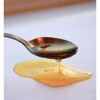 Concern arises from the increased use of fructose and high-fructose corn syrup as a sweetener.
Concern arises from the increased use of fructose and high-fructose corn syrup as a sweetener.
Researchers in Switzerland and Belgium reviewed the evidence.
Here’s what we know.
Animal data
- A high-fructose diet leads to obesity, diabetes, and high cholesterol in rodents.
Fructose intake in humans
- Increases triglyceride blood levels
- In large amounts, it can cause hepatic insulin resistance, increased total and visceral fat mass, and accumulation of ectopic fat in the liver and skeletal muscle.
- These effects may contribute to development of the metabolic syndrome.
Moderate fructose intake
- There’s limited evidence that fructose in moderate amounts, has deleterious effects.
High-fructose diet + high-fat or high-glucose diets
- The excess caloric intake may be the main factor involved in developing the metabolic syndrome.
The bottom line?
The authors concluded, “The progressive replacement of sucrose by high-fructose corn syrup is… unlikely to be directly involved in the [development] of metabolic disease, because high-fructose corn syrup appears to have basically the same metabolic effects as sucrose.”
They caution, “Consumption of sweetened beverages is however clearly associated with excess calorie intake, and an increased risk of diabetes and cardiovascular diseases through an increase in body weight. This has led to the recommendation to limit the daily intake of sugar calories.”
In other words, the calories consumed matter more than their source.
For background, the major source of fructose in our diet is sweetened beverages and products in which caloric sweeteners are added.
Fructose differs from sugar.
- When glucose enters the bloodstream, the body regulates it by releasing insulin.
- By comparison, fructose is metabolized in the liver.
- If the liver can’t process it fast enough for the body to use as sugar, the liver makes fats from the fructose in the form of triglycerides.
The metabolic effects of fructose are the same, regardless of the source.
- This is the case whether it comes from corn syrup, cane sugar, beet sugar, strawberries, onions, or tomatoes.
- Only the amounts are different
- A cup of chopped tomatoes has 2.5 grams of fructose.
- A can of regular (non-diet) soda supplies 23 grams.
- A super-size soda has about 62 grams.
6/22/12 22:58 JR